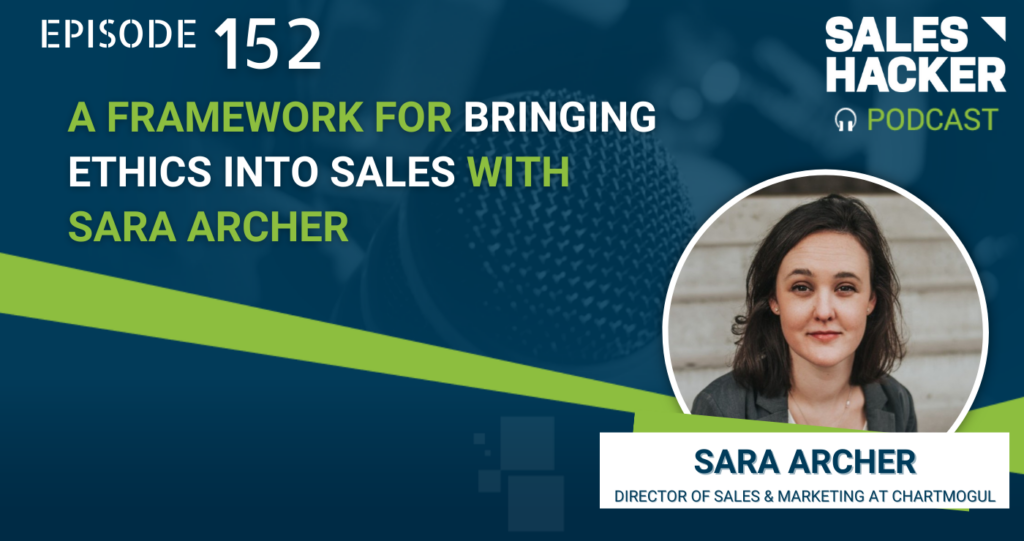If you missed episode 151 check it out here: Leads Don’t Matter: Moving From a Sales-led to a Product-growth Orientation with Stephanie Cox
Subscribe to the Sales Hacker Podcast
Show Agenda and Timestamps
- Show Introduction [00:10]
- From Neuroscience to RevOps: How Sara used her brain to start her sales career [5:56]
- The difference between success and failure [10:06]
- Get out of the dollar bin… or… Why discounts aren’t your friends [13:53]
- The hardest non-technical job in the organization and how to get it [19:49]
- How to be ethical and avoid shady deals [22:09]
- Sam’s Corner [26:02]
Show Introduction [00:10]
Sam Jacobs: This week on the show, we welcomed Sara Archer, the Head of Sales and Marketing for ChartMogul. This company provides analytics and insights around recurring revenue and subscription businesses. We talk with Sara about the whole framework she created for how to think about ethical sales.
Before we get there, we want to thank our sponsor — a company called Outreach. They create sales engagement software. Outreach has been a long time sponsor of this podcast and they just launched a new way to learn.
Outreach on Outreach is the place to learn how Outreach does Outreach. Learn how the team follows up with every lead in record time and how they use Outreach to run account-based plays, manage reps, and so much more using their very own sales engagement platform. Everything is backed up by data. When you’re done, you’ll be able to do Outreach as well as they do. Head to outreach.io/onoutreach to see what they have going on.
Now for some other great sales ideas in my conversation with Sara Archer.
From Neuroscience to RevOps: How Sara used her brain to start her sales career [5:56]
Sam Jacobs: Your original background is in neuroscience, is that right?
Sara Archer: I went to school at the University of Maryland. Prior to starting my bachelor’s degree, I was working for the NSA. I was hoping to keep my government job, and they said, “Why don’t you go to school and study something like linguistics or something related to government work?”
I had to pay loans down, so that seemed like an interesting opportunity. I did those things in concert for a while, and then when I finished my degree, I thought, “Maybe a Ph.D. isn’t for me, and I need to make some money.”
So I took an opportunity to work for a Salesforce Implementation Partner, which is where I got my initial exposure to software.
Sam Jacobs: How have you leveraged your background in neuroscience in your role as a leader in sales and marketing?
Sara Archer: Sales is sort of an amalgamation of science and the humanities. Neuroscience was attractive to me originally because you get to work with people but you also get to run formulaic, scientific prophecies to tease out learnings. And sales is very much the same way, right? There’s a lot of complex variables in working with people. To the extent that you can create processes, and then analyze different areas of the funnel, you can use those insights to improve results. That’s how, in my head at least, those things converge.
The difference between success and failure [10:06]
Sam Jacobs: One of the interesting things about your position is not just that you’re running a sales and marketing organization, but that the product itself is essentially an analytics and insight platform for how people can run their businesses effectively. So I imagine that being good at selling ChartMogul means being good at analyzing businesses. When you look at your own success and you talk about focus, compare it to the alternatives. What’s effective and what might be the pitfalls of spreading too thin?
Sara Archer: If you do annual or quarterly planning and you start to list out all the things that you might want to do, I suspect if you’re an ambitious person, something like 10-20 things will end up on your list. But the truth is, only two or three things, maybe one can actually be the difference between where you are now and your next growth target.
The difference between success and failure is just choosing to spend absolute focus on one to three things, maybe just one.
Sam Jacobs: Are there any examples from the last couple of quarters or months or years where those one or two focuses at ChartMogul helped really deliver the growth you were looking for?
Sara Archer: Pricing is a good example and probably strategic. Sales leaders are thinking a lot about sales management, sales development, and lead gen. But as sales leaders, it’s also our responsibility to think about positioning and pricing. Our pricing used to be based on customer count. So however many customers you imported into your ChartMogul environment, you would pay based on a band.
What we found was actually that created some challenges because while the vast majority of our customers are B2B SaaS businesses, we also have a number of B2C customers, who have very different customer sizes. Imagine a mobile meditation app could have thousands of customers, but maybe they pay $2 or $3 a month. So we analyzed and made a pricing change, which had an outsized impact on our business.
I would encourage sales leaders to think about pricing and positioning as certainly a strategic lever in addition to other things that are on our list.
Get out of the dollar bin… or… Why discounts aren’t your friends [13:53]
Sam Jacobs: Was the net effect of the changes you made an overall price increase or more profitable customers for you?
Sara Archer: Mostly the latter. It also created parity across our customer bases. When our pricing was based on customer count, someone would come in and say, “We have a hundred thousand customers, but an MRR of 40K. So our margins aren’t great. Can you give us a discount?”
When I originally joined, the sales team was giving discounts to try to create equality between different kinds of customers. But what that means, in reality, is that customers are getting sweet deals. Generally, I’m not a big fan of discounting. We really don’t do it at all anymore. As a result, we had more profitable customers, more fairness across our customer base, and easier administration because handling one-off special deals or discounts can create drag for sales and for finance and operations.
Sam Jacobs: I completely agree. Discounts are often used as a mechanism to drive urgency. How did you move your team away from discounting?
Sara Archer: The vast majority of our buyers are on a 14-day trial, so that certainly helps. However, the product is quite complex and technical. As a part of the evaluation, a lot of folks need to import their data, audit things. So, the urgency is created more by value and really anchoring your deal in a specific area of need, right? It’s the “Why now?” question in discovery, that you’re asking to ensure that your deals are really truly qualified.
The hardest non-technical job in the organization and how to get it [19:49]
Sam Jacobs: How did you figure out you were interested in sales?
Sara Archer: I had a mentor and CEO that invested in me really early on and took me to sales meetings where arguably I shouldn’t have been at the table. But I was trying to figure out what I wanted to do in my career, and I was trying on a couple of different things for size. I knew I didn’t want to study engineering or data science necessarily, but I wanted to do something that was difficult. I wanted to do the most difficult thing in the organization that was non-technical. And my CEO at the time said, “That’s sales. And everybody in the organization is going to count on you because you’re going to sell contracts to customers who are going to give us cash to make other investments in the business.”
Sam Jacobs: That makes sense. And so what advice would you give for those following in your footsteps?
Sara Archer: Take some online classes in anything related to sales operations. I think understanding the mechanics and the pipes behind the scenes can really help you be more credible in interacting with customers who are buying a software, if that’s the case. So Salesforce has really fantastic free courses. It’s called Trailhead, and you can learn all these really interesting concepts about data models. It will really help you in your sales career, and it will allow you to sort of explore your interests as well.
How to be ethical and avoid shady deals [22:09]
Sam Jacobs: What’s your approach to making sure that there is an ethical foundation to the teams that you lead?
Sara Archer: When I started leading my own sales teams, I thought, “How can I make sure my team’s doing the right thing by our prospects, by our customers, and by our teammates?” This was important to me because I wanted this litmus to measure all our different interactions against. We came up with what we call our Sales Compass. And it’s basically our guiding principles for ensuring that we’re an ethical sales organization. It’s really simple, but essentially, we say that we want to be timely because time kills deals. Also, we want to be really responsive to our customers. We want to create value at each and every one of our interactions.
We want to be credible, which means being technically conversant in not just what’s happening in the industry, but also with the product and its corresponding integrations. And most importantly, we to be aligned with our customers. We want to align our interests with our customers and we want to understand how to get them to their intended outcome.
Sam’s Corner [26:02]
Sam Jacobs: Hi, everybody. Sam Jacobs, Sam’s Corner. I loved that conversation with Sara Archer. A couple of things stood out for me. One of them is this concept of technical knowledge and product knowledge. If you don’t believe in your product, your industry, or your customers, you’ll be really bad at sales. The other thing is ethical sales. How do you create a system and a framework that brings ethics to sales so that we are good people solving important problems, not people trying to give somebody something they don’t need?
Don’t miss episode #153!
I hope you can go to iTunes and give us a five-star review. If you want to get in touch with me you can find me on LinkedIn at linkedin.com/in/samfjacobs. You can also email me, sam@revenuecollector.com.
If you haven’t checked out Revenue Collective, man, you got to check that out. We did this partnership with Sales Impact Academy: you can now take over 20 courses growing to a hundred by the end of the year, all included in your membership. We just got a bunch of new, amazing things that are happening.
I will talk to you next time.



